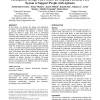Free Online Productivity Tools
i2Speak
i2Symbol
i2OCR
iTex2Img
iWeb2Print
iWeb2Shot
i2Type
iPdf2Split
iPdf2Merge
i2Bopomofo
i2Arabic
i2Style
i2Image
i2PDF
iLatex2Rtf
Sci2ools
CHI
2006
ACM
2006
ACM
Participatory design with proxies: developing a desktop-PDA system to support people with aphasia
In this paper, we describe the design and preliminary evaluation of a hybrid desktop-handheld system developed to support individuals with aphasia, a disorder which impairs the ability to speak, read, write, or understand language. The system allows its users to develop speech communication through images and sound on a desktop computer and download this speech to a mobile device that can then support communication outside the home. Using a desktop computer for input addresses some of this population's difficulties interacting with handheld devices, while the mobile device addresses stigma and portability issues. A modified participatory design approach was used in which proxies, that is, speech-language pathologists who work with aphasic individuals, assumed the role normally filled by users. This was done because of the difficulties in communicating with the target population and the high variability in aphasic disorders. In addition, the paper presents a case study of the prox...
CHI 2006 | Graphical User Interfaces | Human Computer Interaction | Modified Participatory Design | Participatory Design |
| Added | 30 Nov 2009 |
| Updated | 30 Nov 2009 |
| Type | Conference |
| Year | 2006 |
| Where | CHI |
| Authors | Jordan L. Boyd-Graber, Sonya S. Nikolova, Karyn Moffatt, Kenrick C. Kin, Joshua Y. Lee, Lester W. Mackey, Marilyn Tremaine, Maria M. Klawe |
Comments (0)

